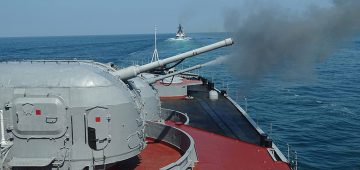The Royal Navy still matters, but does the UK Government truly know it or rather understand how much? Does it properly comprehend the vast effort needed to create a full spectrum fighting fleet capable of handling any foe that threatens Britain, its vital interests at home and abroad, while also striving to protect allies?
And by how much we don’t mean the sea-based ballistic missile submarines – a political tool of deterrence sometimes confused as an actual weapon system to be used in war – which MPs and government ministers have a view on (even if some of them don’t bother with studying the logic of deterrence too deeply).
We mean the finer – yet somewhat obvious – detail of arming ships with a missile system to sink other vessels (and why it’s reckless to allow capability gaps). A few years ago, one of this magazine’s representatives was aboard a frigate patrolling the Arabian Gulf that had no Anti-Submarine Warfare (ASW) capability. The expense of furnishing it with such a thing – and the people to run it – was thought too much. It was a real gamble, but back then the RN could perhaps get away with it, especially in a part of the world where there were not too many potentially hostile submarines.
To do such a thing today would be unthinkable, for a warship sent to patrol the Gulf might suddenly be redirected to face down formidable Russian or Chinese undersea threats. The absence of an Anti-Shipping Missile (ASM) in the Royal Navy’s frigates and destroyers from 2018 is therefore far from reassuring, and represents a similar gamble to the ASW gap. There seems to be a profound lack of understanding in government that such a gap can – should events conspire to place a toothless ship in a battle with a properly armed foe – lead to the deaths of many young men and women. Such an avoidable catastrophe could also deliver a devastating blow to the nation.

When David Cameron’s government got rid of Maritime Patrol Aircraft (MPA) in 2010, and ditched frigates and an ASW carrier, it created a hole the Russians eagerly exploited. The UK was forced to go cap in hand to borrow MPAs from friendly nations. That MPA gap will not be filled by the UK itself until nearly a decade after it was created. Politicians do have a view on the UK’s new Queen Elizabeth Class super-carriers – to some a solid investment in national defence, while others regard them as a sinkhole for taxpayers’ money.
When HMS Queen Elizabeth sails into Portsmouth for the first time later this year she will be an impressive sight, awe-inspiring in her sheer physical presence and promise of power projection. The new Daring Class (Type 45) destroyers are equally imposing warships. Clearly they are not impressive enough to the government for it to set aside money to cure their critical power supply problems as an urgent priority.
Yet those are the vessels that must be able to move and fight without fail while escorting the new carriers. It will be their job to ensure 65,000 tons of British carrier does not end up on the bottom of the sea. To echo a phrase made famous by Admiral Andrew Cunningham in WW2, it takes many years to build a super-carrier but it can be lost, along with everybody aboard, within a few minutes if not adequately protected.
Today we have a Royal Navy that is top heavy with capital ships and lacking enough of the maids of all work that do the legwork, not only of fleet defence for the big ships, but also to exert a presence around the world whenever needed. Frigates and destroyers deter, coerce and fight if need be and are as important as carriers or assault ships. To be ready for their many missions they need to be fully equipped and not handicapped via deliberately created capability gaps imposed by politicians who really should know better. Last time British politicians reaping a Peace Dividend wilfully ran down the Royal Navy, when it needed to become a fighting fleet again many thousands of lives were wasted and a war nearly lost.

It was wartime Prime Minister Winston Churchill who in 1941 pointed out that the Royal Navy was designed to be risked in the service of the Nation and if it couldn’t be, then it was pointless. Risks posed by an enemy should, however, never be enhanced by UK government neglect. Today they are.






Comments
Sorry, comments are closed for this item